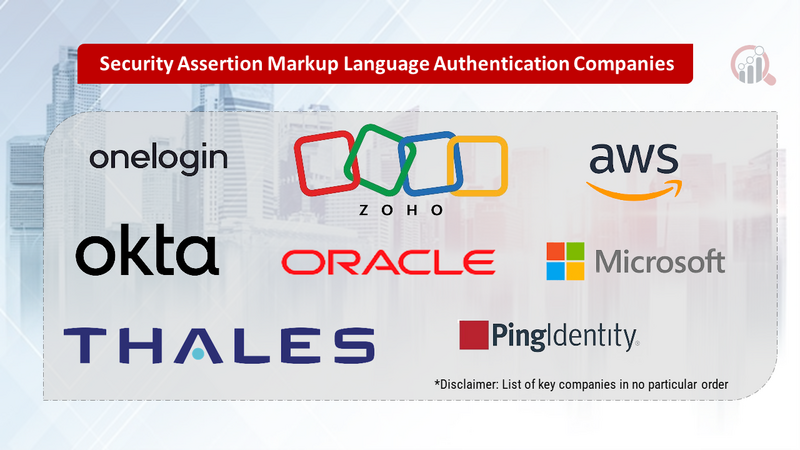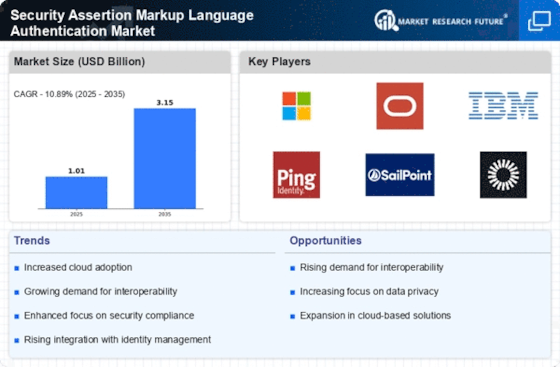Top Industry Leaders in the Security Assertion Markup Language Authentication Market

Security Assertion Markup Language Market: Dive into the Latest News and Updates
In today's interconnected world, ensuring secure access to applications and resources is paramount. Security Assertion Markup Language (SAML) emerges as a crucial tool in this digital fortress, enabling seamless single sign-on (SSO) and identity verification across diverse platforms.
Some of Security Assertion Markup Language Companies Listed Below:
- Thales (France)
- Ping Identity (US)
- Amazon Web Services, Inc. (US)
- Okta (US)
- Oracle (US)
- miniOrange Inc. (US)
- Zoho Corp. (India)
- OneLogin, Inc. (US)
- SSO Easy (US)
- SAASPASS (US)
- Auth0 Inc. (US)
- BIO-key International (US)
- RCDevs (Luxembourg)
- Ariel Software Solutions Pvt. Ltd. (India)
- Microsoft (US)
Strategies Fueling Growth:
-
Cloud-Native SAML Solutions: Offering SAML platforms built specifically for the cloud environment ensures scalability, flexibility, and seamless integration with other cloud services. -
Zero Trust Network Access (ZTNA): Integrating ZTNA functionalities into SAML platforms enhances security by granting least-privilege access and minimizing attack surfaces. -
Biometric Authentication and Passwordless Solutions: SAML providers are adopting biometric authentication like fingerprint or facial recognition, and passwordless technologies, offering secure and convenient access alternatives. -
Compliance and Data Privacy Focus: Offering features and functionalities that comply with data privacy regulations like GDPR and CCPA builds trust and opens doors to data-sensitive industries.
Market Share Decoding: Key Factors to Consider:
-
Functionality and Feature Set: SAML platforms offering comprehensive features like SSO, MFA, access control, user provisioning, and application integration cater to diverse security and access management needs. -
Scalability and Performance: Ability to handle large user bases, process authentication requests efficiently, and scale with business growth is crucial for large organizations. -
Pricing and Cost-Effectiveness: Flexible pricing models, pay-as-you-go options, and tiered plans based on features or user count make SAML accessible to businesses of all sizes and budgets. -
Ease of Use and Integration: User-friendly interfaces, pre-built integrations with popular applications, and developer-friendly APIs simplify implementation and adoption.
New and Emerging Stars: Illuminating the SAML Path:
-
Continuous Authentication and Context-Aware Access: Startups like TrueFace and HYPERSITE explore continuous authentication solutions that monitor user behavior and activity in real-time, adapting access controls and mitigating potential threats proactively. -
Decentralized Identity (DID) Solutions: Companies like Sovrin and SelfKey develop DID solutions, empowering users to own and manage their own digital identities independent of centralized authorities, while also enabling secure SAML-based verification. -
Passwordless Authentication Innovation: Startups like Nok Nok Labs and FIDO Alliance promote passwordless authentication methods like FIDO2 security keys and biometric verification, enhancing security and user convenience within SAML workflows.
Investment Trends: Where the SAML Dollars Flow:
-
Cloud-Native SAML Platforms: Investors are backing companies developing next-generation SAML platforms built for the cloud, catering to the growing demand for scalability, agility, and integration with cloud-based applications.
Latest Company Updates:
January 7, 2024:
-
Focus on decentralized identity (DID) as a potential alternative to SAML: DID empowers individuals to own and control their identity data, raising concerns about data privacy and potential regulatory challenges. -
Microsoft expands Azure AD capabilities with advanced identity governance features: This update allows businesses to implement centralized access control, user provisioning, and compliance management across diverse IT environments, potentially reducing reliance on SAML for specific use cases.
January 8, 2024:
-
AI and machine learning (ML) integration for adaptive security and fraud prevention: IAM platforms are utilizing AI and ML algorithms to detect suspicious activity, identify potential threats, and adapt security measures in real-time, potentially automating tasks previously handled by SAML configurations. -
Compliance and data privacy concerns rise: Regulatory frameworks like GDPR and CCPA are prompting stricter data governance practices and increased transparency in IAM solutions, impacting how SAML data is handled and secured.
January 9, 2024:
-
Growing adoption of single sign-on (SSO) for seamless user access across multiple applications: SSO often complements or even replaces SAML for federated authentication, offering streamlined user experiences. -
Integration with workforce management and human resource (HR) systems for streamlined user provisioning and lifecycle management: This can reduce reliance on manual SAML configuration for user accounts.










